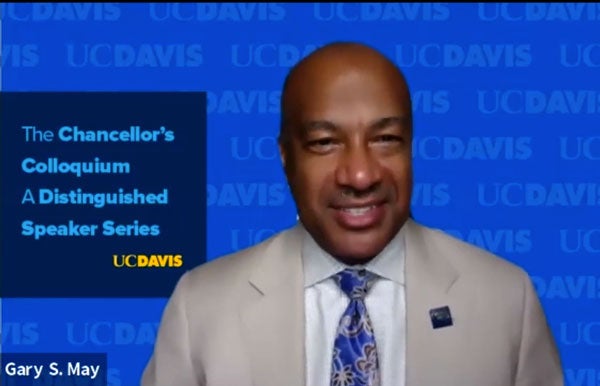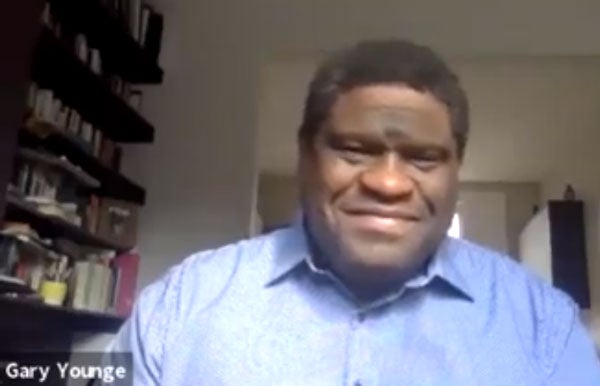In March he spoke in person to a UC Davis audience about his book Another Day in the Death of America, the Campus Community Book Project for 2019-20, a book in which he told the stories of every child and teenager who died of gun violence in the United States in a single day in 2013 — a total of 10.
YOUNGE’S TALK AND Q&A
You can watch Gary Younge’s talk and question-and-answer session above, in an hourlong recording. The question-and-answer session started immediately after his talk, was interrupted by technical difficulties, then continued a week later — when he graciously agreed to pick up where he left off in conversation with Chancellor Gary S. May. The sessions have been spliced together. See excerpts below.
On Aug. 25, Gary Younge “returned” — appearing virtually from his home in London — for a Chancellor’s Colloquium in which he talked again about “another day in America.” Only this time, he talked about the day in late May when a Black man named George Floyd died at the hands of police in Minneapolis, and an incident that occurred 13 hours earlier and 1,200 miles away in New York City’s Central Park. There, a white woman called police to report “an African American man threatening my life” — referring to a birdwatcher who had asked the woman to leash her dog, as required where they were, in the Ramble.
The world saw both incidents on video — a fact Younge referenced in the title of his talk, “Going Viral: Race, Racism and Rebellion in the Midst of a Pandemic.”
“To understand the nature of American racism, it’s important to understand [the two incidents] not separately, but together — the brutal and the banal, the lethal and the liberal, the violence that’s inflicted and the violence that is implied,” said Young, who wrote for The Guardian for 26 years, during which time he lived in and reported from the United States. He joined the faculty of the School of Social Sciences, University of Manchester, in April.
‘How America was built’
“The sight of Floyd being killed in real time is shocking. But news of it isn’t. His death at the hands of police doesn’t contradict what we think and know about relations between African Americans and the police but confirms them.
“We know this because it has historical precedent. We know this because we've seen it happen again and again. We know this because this is not just how America works, it is on some levels how America was built.
“The interaction in Central Park, on the other hand, is in many ways more challenging. In America’s racial morality play the brutal white officer with a badge using disproportionate and deadly force on an unarmed Black man is a familiar character.
“But the Upper West Side female dog walker wearing a mask and using the appropriate racial terminology fits less easily into the cartoonish and crude understanding of how American racism operates.”
They operate not separately but in concert, Younge said. “The dog walker’s threat makes no sense without the promise of a policeman’s violence. His violence wouldn’t be possible without the tacit endorsement of those like her.”
The season of rebellion
And, so, once again, summer is the season of rebellion in America, the same season when Watts, Newark and Detroit erupted in violence in the 1960s, sparked by callous policing, Younge said.
The summer of 2020 comes with a pandemic that lays bare another injustice: that while anybody can die from COVID-19, “some people were more likely to die from it than others,” namely Black Americans and Chicanos.
“These deaths are the collateral damage of racism, the indirect consequence of decades of exclusion that have corralled minorities into the kind of jobs, housing and health situations that would make us particularly vulnerable,” said Younge, who is Black.
On either side of the Atlantic, he said, “this is what systemic discrimination looks like — not isolated incidents but a range of processes built on presumption, assumption, confidence, ignorance and exclusionary institutional, personal and professional networks all buttressed by the dead weight of privilege.”
“We are not dying disproportionately because we are Black and brown. We are dying disproportionately because being Black and brown has made us poor. Race is a construct. ...
“It’s not the virus that discriminates in society. COVID is deadly for everybody. But inequality has laid out the conditions for it to kill Black and brown people disproportionately. Being Black or brown in America and in Britain is a preexisting condition.”
Younge ended by pointing out “the connective tissue between the most brazen forms of state violence and the most banal manifestations of inequality” — George Floyd dying under the weight of a police officer’s knee on his neck, and the tribulations of an ailing pandemic patient on a ventilator. “In both cases, the appeal to get off our necks comes with the plaintive words: I can’t breathe.”

Excerpts from the Q&A
Gary S. May: From your vantage point in London, what do you think the perceptions are of the United States and how we're managing race relations?
Gary Younge: I think the first thing to understand, from the vantage point of Britain and actually the rest of Europe, is that racism is certainly not unique to America, and we saw that with the way that the Black Lives Matter issue pollinated all over Europe. Really, there were 3,000 people out in Reykjavík, Iceland. ... There were huge demonstrations in Britain. And so, from our vantage point, we’ve seen in America much of what we’ve seen here and elsewhere. What’s different is the level of lethality, that things escalate to the point of death. In Britain, the police aren’t armed; in other European countries they are. But the police seem certainly less quick to move to that point.
These deaths look brutal and they really undermine America’s pretension to speak for the rest of the world, to speak for the free world and so on. And that’s been a historical problem. That was true in the Civil Rights period when one of Kennedy's advisors said, “Our friends are embarrassed and our enemies are delighted” when they see these pictures.
So, what we see isn't entirely foreign apart from the lethal nature.
GSM: What does the U.S. need to do beyond reforming police, which goes without saying, to conquer racism, and imagine this world, if it is possible, what are some of the steps you would recommend?

GY: I think that urban America, inner-city America needs a Marshall Plan; it needs to make a massive priority to understand that this is for everybody, everybody’s benefit. I think that’s possible. I think America is the richest country in the world. I am constantly, when I’m asked about the prospects for gun reform, I say, “If you can elect Obama twice and then you can elect Donald Trump, you can do anything.” And, so that would be where I would start, a massive economic and social investment in the country’s inner cities.”
GSM: I strongly agree with that approach.
GSM: What role do you think higher education plays in transforming society in matters of social and racial injustice?
GY: I think higher education can be like the crucible for some kind of meritocracy, that, if you can get the grades, if you can overcome the difficulties of being poor or going to a terrible school, sufficiently to get into higher education, then at that point, there is the chance for you, first of all, to mix with people of all different backgrounds, and that is true for the rich as well as the poor, but secondly, to use your smarts to excel as much as is possible.
Now that’s not going to work for everybody. There still will be discrimination. Professors get stopped and searched. It’s no guarantee that you won’t face racism. But it leaves you equipped to engage. And without that, without the possibility of people knowing that they can get on, then what do they have to lose? The quote which I will mangle somewhat from James Baldwin, “There’s nothing so dangerous as a man who has nothing to lose. You do not need 10 man, only one will do.” And higher education is a place where you can get a foothold.
GSM: That assumes the onus is on us in higher education to preserve some equity in our own institutions as well, though, right?

GY: I think so, yeah. and to look not just for where people are but where they could be, to look for their potential as well as where they have arrived. I know people say, you know, “Pull yourself up by your bootstraps,” but some people were born with loafers. Some people were born without laces at all. And that doesn't mean that they couldn’t make it.
GSM: Where do you think America’s conversations and understanding about racism fall short, which allows racism to perpetuate?
GY: This is true for conversations about race and racism in most places, not just America. There is a squeamishness, first of all about the past, a desire not to talk, you know, why bring up old stuff, I don’t want to talk about what has happened, but just what will happen. And you can’t understand where we are unless you understand how we got here. And, so, that squeamishness, that kind of, people feeling uncomfortable about things that have happened, that is a major obstacle.
And, then I think there is kind of a desire, which is particularly American, to kind of wrap everything in the flag as quickly as you can, and to claim this exceptionalism where racism is understood as an aberration as opposed to actually a kind of, that it’s very difficult to understand America without it. And people take that personally. People take the conversation personally, as opposed to structurally. That, if one is to say that there is racism in America, that doesn’t mean that all Americans or even most Americans are racists. It means they live in country, that they were born into a country, where this sickness pervades. That doesn’t make them personally the people who are bad or wrong, but it means that if they take it personally, then immediately they say, “I haven’t done anything, I didn’t do anything.” Well, actually, first of all, you don’t have to do anything, but secondly, if you haven’t, then maybe you should do something.
I'm fond of saying, in Britain, that people will say, "We won the war," even if they didn't fight. And they will say, "We won the World Cup" — in 1966, the only time we won the World Cup — even if they didn't play. But when it comes to slavery or colonialism, everyone says, well, I didn't do that. Well, you didn't play in 1966, either. You didn't fight in the war, either. Power has many parents, but the brutality that it takes to acquire it is nearly always an orphan.
GSM: “It’s uncomfortable, and we have to have these uncomfortable conversations.
GY: I understand that, I understand why it's uncomfortable, but what we're seeing now is so much more uncomfortable than the conversation that we need to have.
Media Resources
Dateline Staff, 530-752-6556, dateline@ucdavis.edu